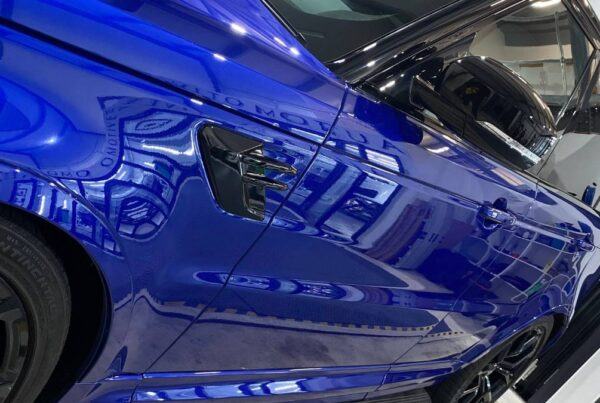The days of never-ending rust problems on vehicles are a thing of the past! Plastics and other anti-rust materials are used to construct most automobiles, pickup trucks, and sport utility vehicles. Rusting and the formation of oxidation and corrosion are still possibilities, however. Because of this, many auto shops now provide protective coatings on the surface and undercarriage of vehicles as an upgrade. But can you prevent rust by using a ceramic coating for protection? To find the answer, read this article by Pave Automotive Professional Car Care.
What causes a car’s paint to rust?
Rust is a chemical process in which an electrolyte, an anode, and a cathode (something that accepts electrons readily) combine. Rust is the byproduct of corrosion.
The painting of a contemporary automobile is a multi-step procedure that begins with applying a base primer or sealer, the paint coats (also known as the pigment), and finally, the transparent coating (which produces the finish). A ceramic coating may be applied once the factory paint job has had sufficient time to dry.
What role does water play in the oxidation process that leads to vehicle rust?
Iron, oxygen, and water are the three essential components to form rust. Two things take place whenever water comes into contact with iron and oxygen. First, the water combines with the carbon dioxide in the air, which results in the formation of an electrolyte. This electrolyte gradually dissolves iron until it is reduced to its component elements, oxygen and hydrogen. As soon as this occurs, the electrons start moving away from the iron and bonding with other metals, forming iron oxide.
A ceramic coating or paint protection film is often sprayed on a vehicle’s painted surface before it is driven to lessen the likelihood of water entering the paint.

How does ceramic coating help to prevent rust on cars?
After understanding the definition of rust, its formation process, and manufacturers’ countermeasures, you may have concluded that you, the car owner, will need to take additional measures to avoid rust on your vehicle.
It is unnecessary to apply an anti-corrosion coating on the undercarriage, exhaust system, or any of the suspension elements of your vehicle. In addition, these components are often manufactured with a metallic covering these days, so you generally do not need to worry about this aspect of the product.
The lower body panels of your vehicle are the primary focus of your attention since they are the parts of the car that are more often covered with the road salt that is kicked up by your tires.
Ceramic coatings use nanotechnology, which enables the coating components to bind together and fill tiny indentations and defects inside porous materials. These materials include the clear coat on your vehicle, glass, bare metals, and plastic trims. It generates an invisible protective screen resistant to scratching and water repulsion, preventing water and oxygen from passing through to the surface of the metal. A ceramic coating directly lowers the probability that your vehicle may rust due to the presence of oxygen and water, which are the two primary contributors to corrosion.
Where is the ideal place to install ceramic coating?
The ideal place to go for professional ceramic coating services is Pave Automotive Professional Car Care, especially if you want to keep the quality of the paint job on your vehicle in top condition. We only use high-quality products from reputable manufacturers to take your vehicle to the next level. If you have any questions regarding the packages we provide, please contact us at the number: 01942 936375, or you may visit our office at the following address: Unit 28 Meadowcroft Way Leigh Business Park, Leigh, Wigan WN7 3XZ. Book your appointment today!








